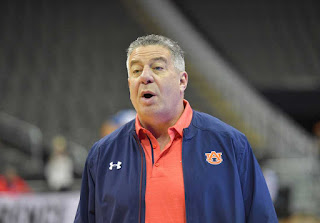Auburn's Bruce Pearl symbolizes the rot in college athletics
Nancy Armour USA TODAY
Published 8:03 AM EDT Mar 29, 2019
KANSAS CITY, Mo. — Bruce Pearl could outlive a cat. Just one of his run-ins with the NCAA would have been enough to torpedo the career of pretty much any other coach. There was the secret taping of a recruit to try and bust a rival. There was the barbecue with recruits, at his house, which he made worse by lying about afterward and encouraging his assistants to do the same. There were the assistants caught up in FBI investigations.
Yet here Pearl is, not only still employed, but back in the Sweet 16 for the first time in almost a decade. With Auburn, no less, which doesn’t remotely resemble the kind of backwater school where most disgraced coaches have to go to find redemption.
But that’s Pearl. There is no jam too big for him to escape, no sin too grave for him to be forgiven. Somehow, he’s managed to turn sleaze into an attribute.
“Coach Pearl is enthusiastic and, as welcoming and exciting as he is, he’s been a tremendous blessing for the Auburn family,” Auburn athletic director Allen Greene said last year.
Mind you, Greene made those comments after Auburn had fired one of Pearl’s assistants, Chuck Person, and suspended players Austin Wiley and Daniel Purifoy for their roles in the FBI investigation into college basketball corruption. This is not to be confused with the corruption investigation that resulted in the suspension of another Pearl assistant, Ira Bowman, earlier this month.
But, hey, how about those SEC titles and improved attendance!
“It's not a cesspool. There are some things that are wrong with it, things that take place that are inappropriate. That's the business of college basketball,” Pearl said Thursday when asked about the state of the game. “The reason why the NCAA is involved in this is because it's their job to monitor. It's their job to enforce. It's their job to encourage people to work hard, to do it the right way and not allow some of the other things to seep into the business because of the business and the money and the pressures.
“So again, it's part of the process. The question is, what do you want to focus on? We need to continue to work to keep it clean, but we need to understand all the good that's being done.”
It’s hard to take any of that seriously, listening to Pearl and his three coaching cohorts at the Midwest Regional. Every program here is tarnished in some way, an apt, if not uncomfortable, representation of the game today.
Like Pearl, Houston’s Kelvin Sampson has a show cause penalty on his resume, punishment for hundreds of impermissible calls to recruits while he was at Indiana and Oklahoma.
North Carolina has acknowledged that some of its athletes took sham classes, but dodged severe NCAA sanctions by saying it couldn’t be a violation because the bogus classes were available to all students, possibly the most novel defense ever for an institution of higher education.
North Carolina has acknowledged that some of its athletes took sham classes, but dodged severe NCAA sanctions by saying it couldn’t be a violation because the bogus classes were available to all students, possibly the most novel defense ever for an institution of higher education.
And while John Calipari hasn’t personally been tied to any violations, his Final Four appearances with UMass and Memphis were later vacated.
“Whether it was going on or not, we'd all be naive to think it was not,” Sampson said when asked about the perpetual stains on college basketball.
Part of the reason Pearl has survived for so long is that he talks a better game than almost anyone. As shrewd and calculated as he is charming, he can deflect from his flaws and failings so effectively you almost forget they existed.
Take Thursday, when he somehow turned a question about his exile from college basketball into a humble brag about being a civil rights champion.
“That was a fight that I was fighting for many years in the '70s and the '80s when I was a young coach, because there was a lot more segregation, there was a lot more racism, antisemitism. It still exists, but worse then,” Pearl said.
How exactly that worked when Pearl, who turned 59 on March 18, didn’t even graduate from Boston College until 1982, I’m not quite sure. Nor do I understand how Pearl squared his passion for social justice with his criticism of Colin Kaepernick for the NFL protests – protests designed to call attention to systemic racism and economic disparity.
But I digress …
The power brokers in college athletics – athletic directors, school presidents, powerful alums – love to claim the moral high ground. In their minds, they are molding the lives and characters of young men and women. The billions that come with it are simply a lucky happenstance.
No doubt Pearl has touched lives and helped many young men along the way. But at what cost? Bottom line, he has survived scandal because he wins. There's something to be said for that but, as we're reminded constantly by guys like him, the game is supposed to be about more than just winning and losing.
Unless that's all a fraud, too.
Follow USA TODAY Sports columnist Nancy Armour on Twitter @nrarmour.
Published 8:03 AM EDT Mar 29, 2019



Commenti
Posta un commento